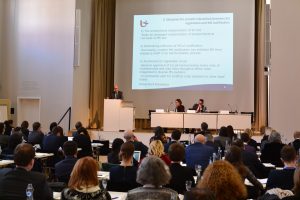Sharing from GAVC LAW
In 2018 we celebrate the 50th year since the adoption of the 1968 Brussels Convention on jurisdiction and the enforcement of judgments in civil and commercial matters. The 1968 attempt to facilitate the free movement of judgments in the EU, helped lay the foundations for the exciting developments in European private international law which have occurred since. Many of the outstanding issues in what is now the Brussels I Recast (also known as EEX-bis; or Brussels Ibis) continue to have an impact on other parts of European civil procedure.
Co-organised by Leuven Law’s Institute of Private International Law and Jura Falconis, KU Leuven’s student law review, this event will consider, capita selecta wise, the application and implications of the Convention and its successors. It will also discuss the future direction of EU private international law both for civil and commercial matters, and for issues outside of commercial litigation. At a time when in most Member States the majority of commercial transactions have some kind of international element, this is a timely refresher for practitioners, judges, students and scholars alike.
Registration and program are here.
PROGRAM
Morning program. Chaired by professor Jinske Verhellen (U Gent)
10:00 – 10:30
Registration and welcome
10:30 – 10:35
Opening by Jura Falconis
10:35 – 11:00
Les grands courants of 50 years of European private international law
Professor Geert Van Calster (KU Leuven)
11:00 – 11:30
Regulatory competition in civil procedure between the Member States
Professor Stéphanie Francq (UC Louvain)
11:30 – 12:00
The application of Brussels I (Recast) in the Member States
Professor Burkhard Hess (Max Planck Institute Luxembourg)
12:00 – 12:15
Discussion
12:15 – 13:00
Lunch
Afternoon program. Chaired by professor Karen Vandekerckhove (European Commission’s Directorate General for Justice and Consumers, UC Louvain)
13:00 – 13:30
Brussels calling. The extra-EU application of European private international law
Professor Thalia Kruger (U Antwerpen)
13:30 – 14:00
The (not so symbiotic?) relation between the Insolvency and the Brussels I regimes
Arie Van Hoe (NautaDutilh, U Antwerpen)
14:00 – 14:30
Alternative Dispute Resolution and the Brussels Regime
Professor Stefaan Voet (KU Leuven)
14:30 – 15:00
Brussels I Recast and the Hague Judgments Project
Professor Marta Pertegas (U Antwerpen)
15:00 – 15:15
Discussion
15:15 – 15:45
Coffee break
15:45 – 16:10
Provisional measures under the Brussels regime
Professor Arnaud Nuyts (ULB)
16:10 – 16:30
Brussels falling. The relationship between the UK and the EU post Brexit
Dr Helena Raulus (UK Law Societies’ Brussels office)
16:30 – 16:50
The current European Commission agenda for the development of European private international law
Dr Andreas Stein (European Commission’s Directorate General for Justice and Consumers)
16:50 – 17:15
The CJEU and European Private International Law
Ilse Couwenberg (Judge in the Belgian Supreme Court/Hof van Cassatie)
17:15 – 17:30
Close of conference
Professor Geert Van Calster (KU Leuven)
17:30 – 18:30
Drinks



 Last weekend, more than a hundred scholars of private international law followed the invitation of Jürgen Basedow, Jan von Hein, Eva-Maria Kieninger, and Giesela Rühl
Last weekend, more than a hundred scholars of private international law followed the invitation of Jürgen Basedow, Jan von Hein, Eva-Maria Kieninger, and Giesela Rühl